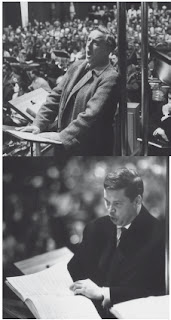The respected German baritone Dietrich Fischer-Dieskau died 18th May 2012, aged 86; just 10 days before his 87th birthday; and 12 days before the Golden Jubilee performance of his extraordinary part in the premiere of War Requiem.
We remember him:
Born in Berlin
Fischer-Dieskau was one of the most famous 'Lieder' performers of the twentieth century. In a career lasting 40 years he was an inspiration to the vast number of singers who have followed his example in this field, and made the singing of lieder a common experience, creating new audiences around the world.
A successful career in opera began at the Berlin City Opera as Posa in Don Carlos in 1948. He sang most of the major baritone roles in the house. From 1949 onwards he appeared regularly at the Vienna State Opera and at the Bavarian State Opera in Munich Bayreuth
In a gesture suffused with symbolism, it was Fischer-Dieskau whom English composer and conductor Benjamin Britten requested to sing in the premiere of Britten's War Requiem in 1962 at the shattered and then rebuilt Coventry Cathedral.
Britten's choice of wording speaks volumes about Fischer-Dieskau's immense reputation among fellow artists: "With great temerity," Britten wrote in his letter, "I am asking you whether you would sing the baritone."
The premiere famously took place in the rebuilt Coventry Cathedral, which had been destroyed in a bombing raid in 1940.
Peter Pears and Dietrich Fischer-Dieskau (left) performed the tenor and baritone solos at the premiere performance of War Requiem.
Dietrich (a veteran conscript of the wartime Wehrmacht) was ‘moved to tears’. Britten recalled “poor F-Dieskau was so upset at the end that Peter couldn’t get him out of the choir stalls! It was that wonderful Strange Meeting”.
In his own memoires a few years later, Dietrich wrote: “I was completely undone … I did not know where to hide my face … dear friends and past suffering arose in my mind.”
Listen to an extract from Britten’s War Requiem; Libera Me (Pt 3.3), with pears, Fischer Dieskau and choir: http://www.youtube.com/watch?v=d55wp3F_yQ8
"To my generation, he was something so special that one was always awestruck," the English mezzo-soprano Dame Janet Baker told Sean Rafferty on Radio 3's In Tune programme. "One just bows before the artistry and the sheer beauty of the sound he made."
He first sang Winterreise in public at age 17, in 1943. He was singing at the town hall of Zehlendorf , a suburb of Berlin
In an interview he gave to The Guardian upon turning 80, the singer recalled, "The whole audience of 200 people and myself had to go into the cellar for two-and-a-half hours. Then when the raid was over we came back up and resumed."
The Second World War defined a large part of the singer's youth. Conscripted into the German army, he was captured in Italy Berlin
One of his most frequent collaborators, the pianist Gerald Moore, wrote in his memoirs: "He had only sung one phrase before I knew I was in the presence of a master." (At the time, Moore
Klaus Staeck, president of the German Academy
Though critics raved about his beautiful voice and musical artistry, Fischer-Dieskau said his aim was simply to get close to the essence of the song.
His intention, he said, was to suppress nothing and make no concessions - either to vocal limitations or popular taste.
Read more about Dietrich Fischer-Dieskau's wonderful relationship with Benjamin Britten, War Requiem and Coventry in THE IDEA WAS GOOD - www.warrequiem.co.uk
requiescat in pace
let him rest in peace





No comments:
Post a Comment